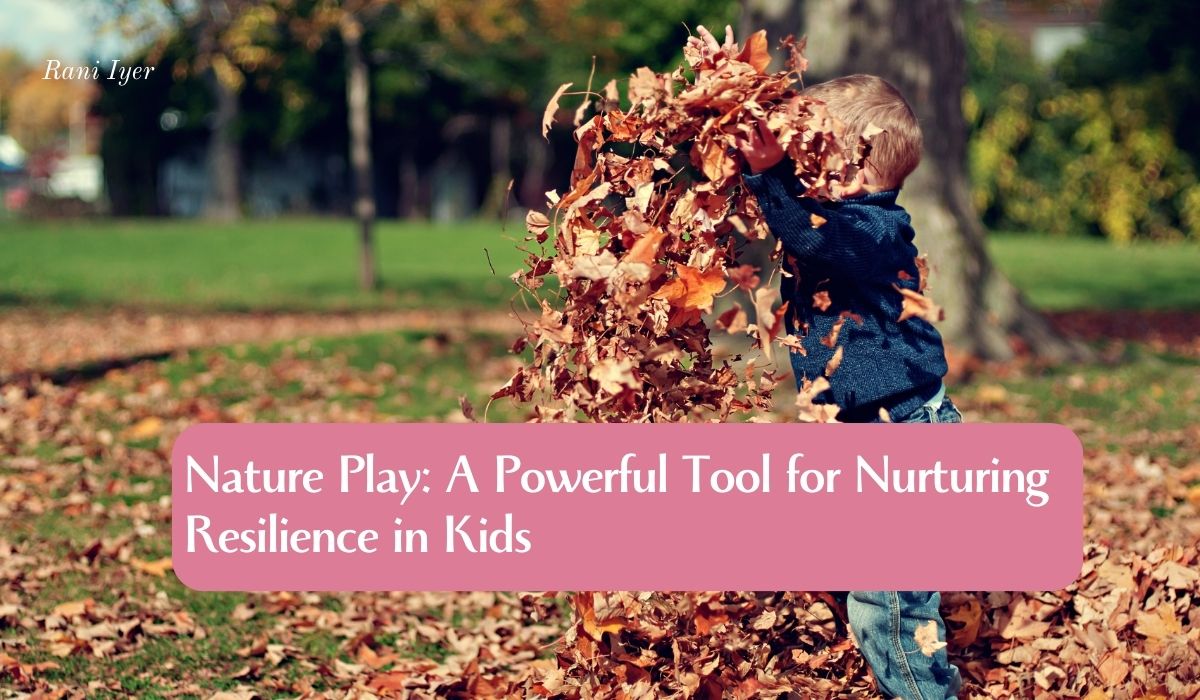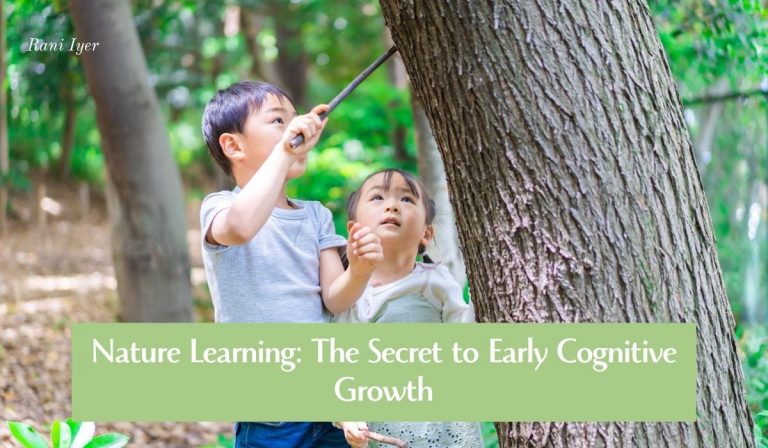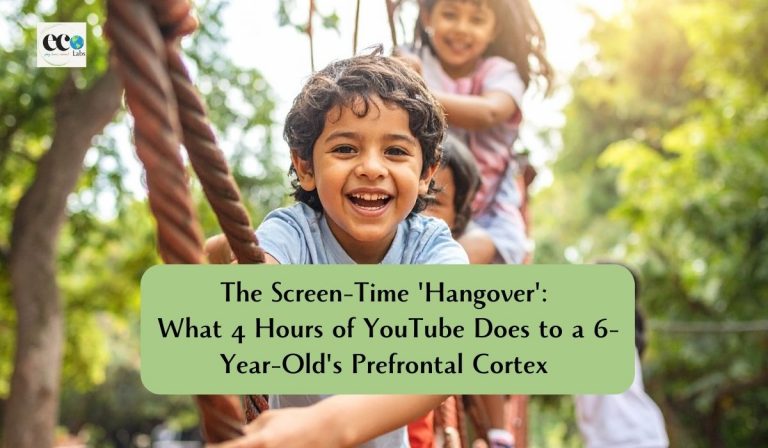Our daily life today is dominated by digital screens. A recent study found that toddlers days are also dominated by screen time. The matter is significant enough for CDC to issue recommendations regarding the screen time for young citizens. This blog post focuses on the nature-inspired play that deserves renewed attention. Recent research reveals that engaging with the natural environment not only nurtures creativity but also enhances executive functioning—a critical set of cognitive skills that includes memory, problem-solving, and self-control. As children delve into the great outdoors, they harness their imaginations, navigate challenges, and foster social connections, all of which contribute to their cognitive development. This article explores the compelling intersection between nature-inspired play and executive functioning, highlighting scientific insights that underline the importance of outdoor experiences. By unlocking the potential of playful interactions with nature, we can lay a strong foundation for lifelong learning and adaptability. Join us as we uncover the transformative power of nature in shaping young minds and equipping future generations with the skills they need to thrive.
Understanding Executive Functioning
Executive functioning is a term that encompasses a range of cognitive processes essential for goal-directed behavior. These processes include memory, flexible thinking, self-control, and the ability to plan and prioritize tasks. Essentially, executive functions are the brain’s management system, allowing individuals to efficiently navigate complex, everyday tasks. In the context of childhood development, these skills are crucial as they enable children to learn effectively, solve problems, and adapt to new situations.
The development of executive functions begins in early childhood and continues into young adulthood. These skills are not innate but are developed through experiences and practice. As children grow, their executive functioning capabilities evolve, allowing them to handle increasingly complex tasks. Activities that challenge their cognitive processes, such as planning a strategy in a game or remembering a sequence of actions, contribute significantly to the development of these skills.
In recent years, researchers and educators have placed a heightened emphasis on understanding how to foster executive functioning in children. Traditional classroom settings provide some opportunities, but there’s growing evidence suggesting that nature-inspired play offers unique and powerful benefits. By engaging in activities that stimulate their executive functions, children can improve their cognitive capabilities in a more holistic and enjoyable manner.
The Connection Between Nature and Cognitive Development
Numerous studies have highlighted the connection between exposure to natural environments and cognitive development. Children who spend more time in nature tend to exhibit better attention spans, enhanced problem-solving skills, and higher levels of creativity. The multisensory experiences provided by natural settings—such as the sounds of birds, the feel of grass underfoot, and the sight of trees swaying in the wind—stimulate various areas of the brain, supporting cognitive growth.
One of the key theories explaining this phenomenon is the Attention Restoration Theory (ART). According to ART, natural environments have a restorative effect on our attention. Unlike urban settings, which often demand directed attention and can lead to cognitive fatigue, natural environments allow for involuntary attention, providing a mental break and reducing stress. This restorative experience is particularly beneficial for children, whose cognitive systems are still developing and can easily become overwhelmed.
Moreover, nature provides a dynamic and unpredictable environment that challenges children’s cognitive abilities. Navigating through a forest, for instance, requires spatial awareness, memory, and problem-solving skills. These experiences, in turn, enhance children’s executive functioning by encouraging them to think critically and adapt to new situations. The unstructured and spontaneous nature of outdoor play also fosters creativity, as children are free to imagine and create their own games and scenarios.
Benefits of Nature-Inspired Play on Executive Functioning
Nature-inspired play offers a myriad of benefits that extend beyond physical health, significantly impacting children’s cognitive and emotional well-being. One of the primary advantages is the enhancement of working memory. Engaging with the natural environment often involves remembering paths, identifying plants and animals, and recalling the rules of self-created games. These activities exercise the brain’s memory centers, thereby improving the ability to retain and manipulate information.
Another crucial benefit is the development of self-regulation skills. Nature play frequently involves social interactions where children must negotiate, take turns, and resolve conflicts. These situations require a high level of emotional and behavioral control. By practicing self-regulation in a playful and low-stakes environment, children can transfer these skills to more structured settings, such as the classroom or home.
Furthermore, nature-inspired play encourages flexible thinking and problem-solving. The unpredictability of natural environments means that children must constantly adapt their strategies and think on their feet. Whether it’s figuring out how to climb a tree or creating a makeshift bridge over a stream, these challenges promote cognitive flexibility and innovative thinking. These skills are integral to executive functioning and are essential for academic success and everyday problem-solving.
Key Elements of Effective Nature-Inspired Play
For nature-inspired play to be most effective in enhancing executive functioning, certain elements should be present. Firstly, play should be child-directed and unstructured. This means allowing children the freedom to explore, create, and interact with their environment without strict guidelines or adult intervention. Unstructured play provides opportunities for spontaneous and imaginative activities, which are critical for cognitive development.
Secondly, the play environment should be rich in sensory experiences. Natural settings provide a variety of textures, smells, sounds, and sights that stimulate the sensory systems and support brain development. Activities that engage multiple senses simultaneously, such as digging in the dirt or listening to the sounds of a stream, are particularly beneficial. These sensory experiences help to anchor learning and improve memory retention.
Lastly, social interaction is a vital component of nature-inspired play. Cooperative games, team challenges, and group explorations encourage children to communicate, collaborate, and develop social skills. These interactions not only enhance emotional intelligence but also foster executive functions such as planning, decision-making, and conflict resolution. Providing opportunities for children to play together in nature can therefore amplify the cognitive benefits.
Research Studies Supporting Nature Play and Executive Functioning
The body of research supporting the connection between nature play and executive functioning is robust and growing. One landmark study conducted by the University of Illinois found that children diagnosed with Attention Deficit Hyperactivity Disorder (ADHD) experienced significant improvements in concentration after spending time in natural settings. The researchers concluded that even short periods of nature exposure could enhance attention and reduce symptoms of ADHD.
Another study published in the journal “Frontiers in Psychology” explored the effects of outdoor play on children’s cognitive development. The researchers observed that children who engaged in regular nature play showed marked improvements in working memory, cognitive flexibility, and inhibitory control compared to their peers who primarily played indoors. These findings suggest that the dynamic and stimulating nature of outdoor environments plays a crucial role in cognitive development.
Additionally, a long-term study by the University of Exeter examined the impact of green spaces on cognitive development in children. The results indicated that children who grew up with access to green spaces performed better on tests of spatial working memory and overall executive functioning. The researchers emphasized the importance of integrating nature into urban planning and educational settings to support cognitive health.
Practical Ways to Incorporate Nature Play into Daily Life
Incorporating nature play into daily life does not require a complete lifestyle overhaul. Simple, everyday activities can provide significant cognitive benefits. One practical approach is to establish a routine that includes outdoor play. This could be as simple as visiting a local park after school or taking a nature walk on weekends. Consistent exposure to natural environments helps to build a strong foundation for executive functioning.
Parents and educators can also create opportunities for nature-inspired play within their immediate surroundings. For instance, a backyard can be transformed into a mini nature playground with elements such as a sandbox, garden, or climbing structure. Encouraging children to engage in free play in these environments allows them to explore and interact with nature on a regular basis.
Moreover, integrating nature-themed activities into indoor play can also be beneficial. Crafts using natural materials, indoor gardening projects, and nature-based storytelling are all ways to bring elements of the outdoors inside. These activities not only stimulate the senses but also promote creativity and cognitive growth. By making nature play a regular part of daily life, we can support children’s executive functioning in a holistic and enjoyable way.
Nature-Inspired Play Environments: Designing for Success
Designing effective nature-inspired play environments requires thoughtful consideration of various factors. The goal is to create spaces that are safe, engaging, and conducive to cognitive development. One key element is diversity in play options. A well-designed nature play area should offer a range of activities that cater to different interests and developmental stages. This could include climbing structures, water play areas, open fields, and quiet spaces for reflection.
Safety is another crucial consideration. While risk-taking is an important part of play, it is essential to ensure that the environment is free from hazards. This means regular maintenance of equipment, proper supervision, and clear guidelines for safe play. By creating a safe yet challenging environment, children can explore and learn without unnecessary risks.
Lastly, accessibility is vital. Nature-inspired play environments should be inclusive and accessible to all children, regardless of their physical abilities or socioeconomic background. This can be achieved through thoughtful design, such as incorporating wheelchair-accessible paths and providing affordable or free access to natural spaces. By ensuring that all children have the opportunity to engage in nature play, we can support cognitive development on a broader scale.
Challenges and Barriers to Implementing Nature Play
Despite the clear benefits, there are several challenges and barriers to implementing nature-inspired play. One significant barrier is the increasing urbanization and lack of access to natural spaces. Many children, particularly those in urban areas, have limited opportunities to interact with nature due to the absence of green spaces. This can be addressed through urban planning that prioritizes the creation of parks, community gardens, and green corridors.
Another challenge is the growing reliance on screen-based activities. With the prevalence of digital devices, children are spending more time indoors and less time engaging in physical and outdoor play. To combat this trend, it is important to raise awareness about the benefits of nature play and encourage families to prioritize outdoor activities. Setting limits on screen time and promoting outdoor play as a fun and rewarding alternative can help shift behaviors.
Additionally, there are practical constraints such as safety concerns and busy schedules. Parents may worry about the risks associated with outdoor play or struggle to find the time to facilitate these activities. Addressing these concerns requires a community effort, including providing safe and accessible play areas, offering organized nature programs, and promoting the importance of nature play through education and advocacy.
Why nature-based games are a potent learning tool
Executive functions (working memory, inhibitory control, and cognitive flexibility) predict school readiness and long-term outcomes, and they’re malleable in early childhood.
Natural environments add an extra boost. Studies show that more “green” around schools is linked with better working memory growth and lower inattentiveness across a school year, partly via reduced air pollution exposure. Recess or lessons conducted in greener school areas also produce short-term improvements in selective/sustained attention and impulse control—the very EF skills children use to follow rules, stay on task, and self-regulate.
Recent classroom research further suggests that regular, structured time in green schoolyards is associated with greater self-regulation gains in kindergarten, with larger effects the more often and longer children are in green spaces.
Complementary studies in nature-based and blended preschools show growth in EF and self-regulation across the year, with particularly strong benefits for children from lower-SES backgrounds when nature is a regular, integrated practice.
How Ecolabs-style games exercise EF—mechanisms that matter
1) Attention restoration + EF “recharge.”
Nature settings reduce directed-attention fatigue, making it easier for children to hold rules in mind and resist impulses during play (Attention Restoration Theory).
2) Repeated, progressively harder practice.
EF grows when children repeatedly practice skills under rising challenge—exactly what well-designed games do.
3) Active, social, goal-oriented play.
Short, playful interactions and rule-based activities can measurably improve self-control and reasoning in early childhood, especially when they’re hands-on and collaborative.
4) Outdoor movement + unstructured exploration.
Randomized and quasi-experimental work indicates that outdoor play opportunities are feasible at scale and support cognitive/EF development across a preschool year.
Conclusion: Embracing Nature for Enhanced Executive Functioning
The science of nature-inspired play and its impact on executive functioning is compelling and underscores the importance of integrating natural environments into children’s daily lives. By engaging in nature play, children can develop critical cognitive skills such as memory, problem-solving, and self-control, which are essential for lifelong learning and adaptability. The benefits of nature play extend beyond cognitive development, fostering creativity, emotional well-being, and social connections.
As we navigate a world increasingly dominated by screens and structured activities, it is vital to recognize the value of unstructured, nature-inspired play. By providing opportunities for children to explore, imagine, and interact with the natural world, we can support their cognitive and emotional growth in meaningful ways. This requires a collective effort from parents, educators, urban planners, and policymakers to create and promote environments that encourage nature play.
Embracing nature as an integral part of childhood not only enhances executive functioning but also lays the foundation for a healthier, more balanced, and resilient future generation. By unlocking the potential of playful interactions with nature, we can equip children with the skills they need to thrive in an ever-changing world. Let us advocate for and invest in nature-inspired play, ensuring that all children have the opportunity to experience the transformative power of the great outdoors.
References
Amicone, G., Petruccelli, I., De Dominicis, S., Gherardini, A., Costantino, V., Perucchini, P., & Bonaiuto, M. (2018). Green breaks: The restorative effect of the school environment’s green areas on children’s cognitive performance. Frontiers in Psychology, 9, 1579. https://doi.org/10.3389/fpsyg.2018.01579
Center for Disease Control (CDC). HIOPS for Screen Time Limits. https://www.cdc.gov/early-care-education/php/obesity-prevention-standards/screen-time-limits.html Retrieved 8/23/25
Dadvand, P., Nieuwenhuijsen, M. J., Esnaola, M., Forns, J., Basagaña, X., Alvarez-Pedrerol, M., Rivas, I., López-Vicente, M., Pascual, M. D. C., Su, J., Jerrett, M., Querol, X., & Sunyer, J. (2015). Green spaces and cognitive development in primary schoolchildren. Proceedings of the National Academy of Sciences, 112(26), 7937–7942. https://doi.org/10.1073/pnas.1503402112
Diamond, A., & Lee, K. (2011). Interventions shown to aid executive function development in children 4–12 years old. Science, 333(6045), 959–964. https://doi.org/10.1126/science.1204529
Ernst, J., Stelley, H., & colleagues. (2024). Supporting young children’s self-regulation through nature-based practices in preschool. Early Childhood Education Journal, 52, (advance online publication). https://doi.org/10.3390/education
Garzillo, I., Fortuna, A., Oliveri, P., Santamaria, V., Boccia, G., Succi, S., … & recently, PRO-ECO Consortium. (2025). Effectiveness of outdoor play to improve preschoolers’ cognitive development: The PRO-ECO randomized trial. Scientific Reports, 15. (Advance online publication). PMC
Yaffe, Y., Yuan, Z., & Kushnir, T. (2025). Short and playful interactions enhance self-control and divisive reasoning in early childhood social cognition. Scientific Reports, 15. (Advance online publication). Nature



